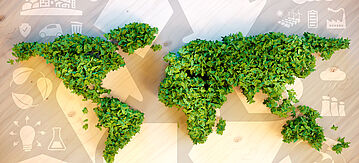Sustainable resource use and circular economy

Sustainable resource use, resource efficiency and circular economy
In recent years, Germany has worked with great political commitment to establish the issue of resource efficiency at G7 level. The founding of the G7 Alliance on Resource Efficiency (ARE) during Germany’s 2015 G7 Presidency was an internationally important milestone. Since then, resource efficiency has been an integral part of the G7 environment communiqué. Drawing on the German Resource Efficiency Programme (ProgRess), resource efficiency is understood as a comprehensive, whole-lifecycle approach to responsible resource management. At G7 level, it is a key vehicle for working on aspects of the sustainable management of natural resources (for example sustainable product design, resource-efficient industrial processes, waste management). Additional G7 milestones related to resource efficiency include the adoption of the Toyama Framework on Material Cycles in 2016 and the Bologna Roadmap in 2017.
Germany’s 2022 G7 Presidency aims to work with the other G7 countries to demonstrate how resource efficiency and circular economy can be promoted globally and used to achieve international climate and biodiversity targets.
In addition, the Bologna Roadmap, which ends in 2022, is to be reviewed and updated under the German Presidency.
The Roadmap is the main G7 guideline on resource efficiency and circular economy and is a working document of the G7 Alliance on Resource Efficiency. The five-year Bologna Roadmap, adopted in 2017 under Italian Presidency, establishes 11 priority fields of action for the G7 in the area of resource efficiency:
- Resource efficiency indicators
- Resource efficiency and climate change
- Sustainable material management at international level
- Economic analysis of resource efficiency
- Citizen involvement and raising public awareness
- Private sector actions
- Food waste
- Plastics
- Green Public Procurement (GPP)
- Lifetime extension product policies
- Resource efficiency and Next Production Revolution (NPR)
Chemicals management
Building on the 2016 Communiqué of the G7 Toyama Environment Ministers’ Meeting and marking Germany’s Presidency of the 5th session of the International Conference for Chemicals Management (ICCM5), now planned for 2023 in Bonn, the German Presidency is putting the need for action on chemicals management on the global agenda again. This is also in response to troubling reports from the United Nations Environment Programme (UNEP). UNEP now speaks of a triple crisis for the global environment, with climate change and biodiversity loss joined by pollution, which is often caused by chemicals and their wastes. In Global Chemicals Outlook II (GCO-II), UNEP makes it clear that this crisis may grow worse, in view of the projected fourfold increase in chemicals production from 2000 to 2030, with considerable negative impacts on the environment and human health. According to World Health Organization (WHO) estimates, at least two million people around the world already die annually due to chemicals. Globally, chemicals also cause air and (drinking) water pollution, biodiversity loss, greenhouse gas emissions and damage to soil.
In light of this, GCO-II concludes that business as usual can no longer be an option. The report identifies needs primarily in capacity building, creation of needed legal infrastructure, enhancement of enforcing institutions, necessary technical equipment and the provision of qualified personnel in developing countries and emerging economies. The 5th session of the International Conference for Chemicals Management under German Presidency is the place to agree on solutions, as explicitly emphasised at the United Nations Environment Assembly (UNEA-5.2) in March 2022.
Tackling the pollution crisis also requires an improved scientific basis for international chemicals and waste policy. The UNEA-5.2 resolution to initiate a science-policy panel in this area is a first key step in this direction.
